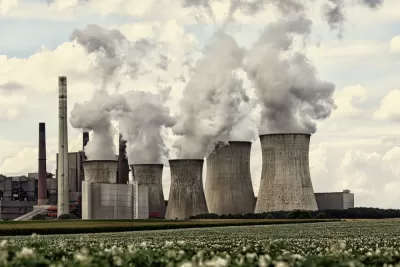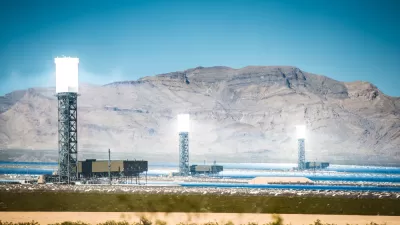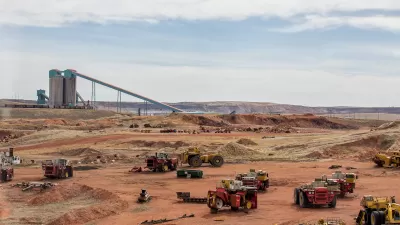It took less than a year for the EPA to finalize the Affordable Clean Energy rule, which will allow older coal-burning plants to continue operating, in the Trump administration's most consequential environmental rollback accomplished to date.

"The Trump administration on Wednesday replaced former President Barack Obama’s effort to reduce planet-warming pollution from [existing] coal plants with a new rule that would keep plants open longer and undercut progress on reducing carbon emissions," reports Lisa Friedman for The New York Times.
The measure represents the Trump administration’s most ambitious effort to protect coal and, along with its rollback of vehicle pollution rules and its plan to withdraw from the Paris climate agreement, ranks among its boldest moves to minimize the threat of global warming.
Both the Safer Affordable Fuel-Efficient (SAFE) Vehicles Rule that freezes fuel economy standards at the year 2020 levels and the withdrawal from the Paris accord, while announced and initiated, have yet to be finalized.
"The Trump rule largely gives states the authority to decide how far, if at all, to scale back emissions, while the Obama plan would have set national emissions limits and mandated the reconstruction of power grids to move utilities away from coal," continues Friedman. The Clean Power Plan never took effect having been suspended by the U.S. Supreme Court in February 2016 after a bipartisan coalition of 24 states sued the Environmental Protection Agency in October 2015.
By Wednesday afternoon, the new regulation, known as the Affordable Clean Energy [ACE] rule, had already prompted a flurry of challenges, with attorneys general in California, Oregon, Washington State, Iowa, Colorado and New York saying they intended to sue to block the measure.
At issue is whether the Environmental Protection Agency has authority to set national restrictions on carbon emissions and force states to move away from coal, as assumed under Mr. Obama’s rule. Under the Trump administration’s interpretation, the agency only has authority over environmental infractions at individual plants, like chemical spills and improper handling of hazardous materials.
Far-reaching political consequences of court battle
"The new rule could face an uphill battle in court," reports Anna M. Phillips for the Los Angeles Times. "The Clean Air Act obligates the federal government to regulate greenhouse gas emissions, and the Trump administration may have difficulty convincing the courts that its rule is the best way to do that."
"If the U.S. Supreme Court ultimately upholds the administration’s approach to pollution regulation, it would shut down a key avenue that future presidents could use to address climate change," notes Friedman.
“Unlike the Clean Power Plan, ACE adheres to the Clean Air Act and gives states the regulatory certainty they need to continue to reduce emissions and provide a dependable, diverse supply of electricity that all Americans can afford," said EPA Administrator Andrew Wheeler.
The rule is clearly a boon for the coal industry in the sense that federal regulation is greatly relaxed, if not essentially removed, but it still must deal with market forces, i.e., competition from natural gas and renewable energy sources such as wind and solar, which have resulted in the shuttering of more coal plants than under the Obama administration, and political efforts from environmental and public health opponents such as the recently announced Beyond Carbon campaign, launched by a $500 million donation from Bloomberg Philanthropies.
The ACE rule, which was submitted on June 19 to the Federal Register, becomes effective 60 days after it is published in the register.
Multi-media coverage
- NPR: Jeff Brady reports on All Things Considered on Wednesday afternoon.
- PBS Newscast: Juliet Eilperin, who reported with Brady Dennis on the rule finalization for The Washington Post, was interviewed on the PBS NewsHour by Amna Nawaz on Wednesday evening.
Related in Planetizen:
-
'Affordable Clean Energy Rule' Proposed to Replace Clean Power Plan, August 22, 2018
-
Coal Power Plants to Retire Faster Under Trump, May 15, 2018
-
Trump Administration to Repeal Obama's Clean Power Plan, October 9, 2017
-
Trump Targets Obama's Signature Environmental Rule, the Clean Power Plan, February 23, 2017
-
Supreme Court Puts Obama's Key Climate Initiative on 'Hold', February 10, 2016
FULL STORY: E.P.A. Finalizes Its Plan to Replace Obama-Era Climate Rules

Maui's Vacation Rental Debate Turns Ugly
Verbal attacks, misinformation campaigns and fistfights plague a high-stakes debate to convert thousands of vacation rentals into long-term housing.

Planetizen Federal Action Tracker
A weekly monitor of how Trump’s orders and actions are impacting planners and planning in America.

In Urban Planning, AI Prompting Could be the New Design Thinking
Creativity has long been key to great urban design. What if we see AI as our new creative partner?

King County Supportive Housing Program Offers Hope for Unhoused Residents
The county is taking a ‘Housing First’ approach that prioritizes getting people into housing, then offering wraparound supportive services.

Researchers Use AI to Get Clearer Picture of US Housing
Analysts are using artificial intelligence to supercharge their research by allowing them to comb through data faster. Though these AI tools can be error prone, they save time and housing researchers are optimistic about the future.

Making Shared Micromobility More Inclusive
Cities and shared mobility system operators can do more to include people with disabilities in planning and operations, per a new report.
Urban Design for Planners 1: Software Tools
This six-course series explores essential urban design concepts using open source software and equips planners with the tools they need to participate fully in the urban design process.
Planning for Universal Design
Learn the tools for implementing Universal Design in planning regulations.
planning NEXT
Appalachian Highlands Housing Partners
Mpact (founded as Rail~Volution)
City of Camden Redevelopment Agency
City of Astoria
City of Portland
City of Laramie




























